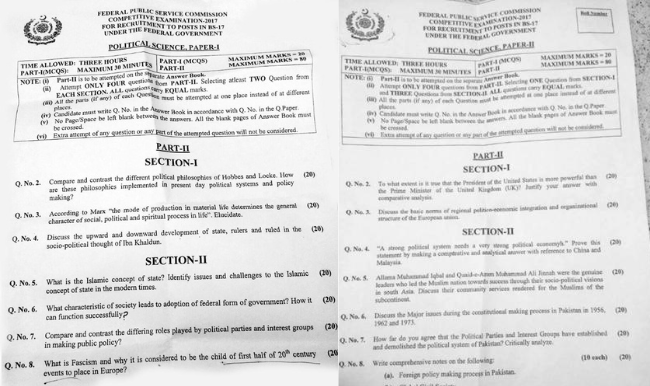Table of Contents
TogglePOLITICAL SCIENCE 2017
PAPER-I
SECTION-I
Q. No. 2. Compare and contrast the different political philosophies of Hobbes and Locke. How are these philosophies implemented in present-day political systems and policymaking? (20)
Q. No. 3. According to Marx “the mode of production in material life determines the general character of social, political and spiritual process in life”. Elucidate. (20)
Q. No. 4. Discuss the upward and downward development of state, rulers, and ruled in the socio-political thought of Ibn Khaldun. (20)
SECTION-II
Q. No. 5. What is the Islamic concept of state? Identify issues and challenges to the Islamic concept of state in modern times. (20)
Q. No. 6. What characteristic of society leads to the adoption of a federal form of government? How it can function successfully? (20)
Q. No. 7. Compare and contrast the differing roles played by political parties and interest groups in making public policy. (20)
Q. No. 8. What is Fascism and why is it considered to be the child of the first half of 20th-century events to place in Europe?
PART-II
SECTION-I
Q. No. 2. To what extent is it true that the President of the United States is more powerful than the Prime Minister of the United Kingdom (UK)? Justify your answer with comparative analysis. (20)
Q. No. 3. Discuss the basic norms of regional political-economic integration and the organizational structure of the European Union. (20)
SECTION-II
Q. No. 4. “A strong political system needs a very strong political economy.” Prove this statement by making a comparative and analytical answer with reference to China and Malaysia. (20)
Q. No. 5. Allama Muhammad Iqbal and Quaid-e-Azam Muhammad Ali Jinnah were the genuine leaders who led the Muslim Nation towards success through their socio-political visions in South Asia. Discuss the community services rendered for the Muslims of the subcontinent. (20)
Q. No. 6. Discuss the Major issues during the constitutional-making process in Pakistan in 1956, 1962, and 1973. (20)
Q. No. 7. How far do you agree that the Political Parties and Interest Groups have established and demolished the political system of Pakistan? Critically analyze. (20)
Q. No. 8. Write comprehensive notes on the following: (10 each)
- Foreign policy-making process in Pakistan.
- Global Civil Society
